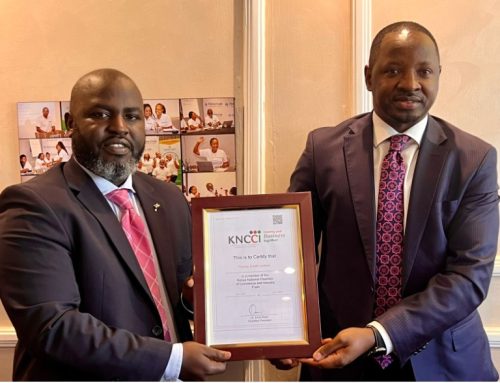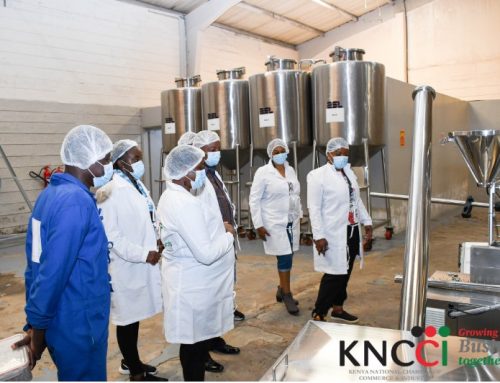Background
The ripple effect of COVID-19 on economic activities, livelihoods and food security in East Africa and the Great Lakes. Governments throughout the region moved swiftly to adopt far-reaching measures to limit the spread of COVID-19, including the closure of international borders, movement restrictions, curfews and lockdowns.
While these measures appear to have curbed the pandemic’s progression, its negative repercussions have led to a near-total halt to air transport, tourism, agriculture and other extractive industry activities.
To discuss the impact of Covid-19 in Africa and the future of Africa Continental Free Trade Area (AfCFTA), the Kenya National Chamber of Commerce and Industry (KNCCI) in partnership with the United Nations Economic Commission for Africa (UNECA), East Africa Chamber of Commerce, Industry and Agriculture, the Great Lakes Region Private Sector Forum organized a webinar session to discuss and identify opportunities for Covid-19 recovery mechanism and way forward for AfCFTA trade and integration.
To help consolidate the highlights KNCCI together with the fore mentioned partners brought on board panelist representatives from: Secretary General of the Uganda National Chamber of Commerce and Industry Ms. Olive Kigongo; Chairman of the East Africa Chamber of Commerce, Industry and Agriculture Mr. Kahotho; Director UNECA- Regional Integration and Trade Division, Mr. Stephen Karingi, PhD; Director, UNECA- ECA Sub-Regional Office for East Africa, Mama Keita, Senior Trade Advisor Ministry of Trade ,Mr. George DInda
Topics Discussed.
- Opportunities that AfCFTA presents
- Impact of Covid-19 on trade Facilitation and Performance in Africa
- Mechanism put in place to support regional markets and supply chain stabilization in the post Covid-19
- Possible Economic Stimulus and Fiscal measures taken to cushion businesses
- Critical economic sectors that needs priority in the Covid-19 recovery process
- Impact of Covid-19 on the EAC businesses and the Government Responses
- Post Covid-19 economic recovery measures that needs to be implemented to support private sector to contribute to the AfCFTA and Trade Integration Agenda
- Opportunities that AfCFTA presents
The African Continental Free Trade Area (AfCFTA) Agreement presents Africa with a unique opportunity to unleash its economic potential for inclusive growth and sustainable development. It aims to promote agricultural transformation and growth in Africa and contribute to food security, as well as improve competitiveness through regional agricultural value chains development and incentivize critical investments in production and marketing infrastructure.
In his opening remarks, the UNECA Regional Director, Integration and Trade Division, Dr. Stephen Karingi stated that that AfCFTA has the potential to deepen not only the regional integration of the continent but also has allowed the African countries to do more of value addition in the production processes. According to UNECA, it is estimated that by 2020, AfCFTA will increase significantly and that two-thirds of this increase would be on value addition.
Dr. Karingi, said the Africa Continental Free Trade Area (AfCFTA) could help mitigate effects of COVID-19, especially on pharmaceuticals and food stuffs.
“A rapid and ambitious implementation of the AfCFTA will go a long way in hastening the recovery from COVID-19 impacts, while cushioning Africa against future adverse effects of shocks such as this,” said Dr. Karingi.
Africa spends billions on drugs annually and depends heavily on China and other countries in Europe and Asia for its pharmaceutical supply, some of which are badly affected by the current COVID-19 pandemic.
Mr. Karingi said African countries could start manufacturing the drugs themselves, which would not only be cheaper, but would also help secure the quality and safety of supply; and contribute to financial sustainability as import bills are increasing across the continent.
AfCFTA had agreed on five priority services – financial services, communication, transport, tourism and business services – and will engage in the negotiations through a request and offer process to make specific sector commitments. Due to Covid-19 the member’s states are now re negotiating to add services such as E-commerce, Health and Digital Education.
In the ensuing discussion, the EACCIA Chairman, Mr. Kahotho echoed that critical role KNCCI has to play for the successful implementation of the AfCFTA agenda. Mandated to facilitate trade, KNCCI must see that during this time of the pandemic, trade must be facilitated so that jobs can be created and also to see that we add value to our natural resources.
- Possible Economic Stimulus and Fiscal measures taken to cushion businesses
The UNECA – ECA Sub – Regional Office for East Africa, Mama Keita stated that the Covid -19 crisis has shown the role that the state must play in the development process in the respective countries. Most countries are now rising to the challenge and cushioning businesses through the following measures:
- A liquidity be made available to the private sector to ensure the continuity of essential purchases and all SMEs that are dependent on trade can continue to function.
- Emergency economic stimulus.
- Waiver of all interest payments
- Flexibility in taxation
- Payments of areas to private sectors
- And Government provision of guarantors to SMEs
- Subsidies
- Critical economic sectors that needs priority in the Covid-19 recovery process
- Health
- Tourism
- Logistics
- Constructions
- Domestic markets
- Agriculture
- Mechanism put in place to support regional markets and supply chain stabilization in the post Covid-19
According to the Ugandan Chamber of Commerce and Industry Secretary General, Ms. Brenda, Uganda Has put the following measures;
- Support to domestic markets and encouragement of consumption of domestic goods
- Allowing movement of essential goods and services by not restricting the logistic industry
- Ensuring that there are adequate storage facilities to cushion spoilage of perishable goods
- Encouraging value addition to the agricultural sector products
- Impact of Covid-19 on the EAC businesses and the Government Responses
- Inadequate access to sourcing raw materials
- Facing cross border restrictions
- Decline of Export market
- Decline in sales
- Post Covid-19 economic recovery measures that needs to be implemented to support private sector to contribute to the AfCFTA and Trade Integration Agenda.
- Consumption of local products
- Securing the demand and supply for locally produced goods
- Support innovation, manufacturing
- African Countries should trade amongst themselves
- There must be access to liquidity and new financial means in the future
- Deepen and strengthen the African financial markets
- Resource mobilization
- Ensuring competitiveness amongst African countries
- Deepening regional value chain







Leave A Comment